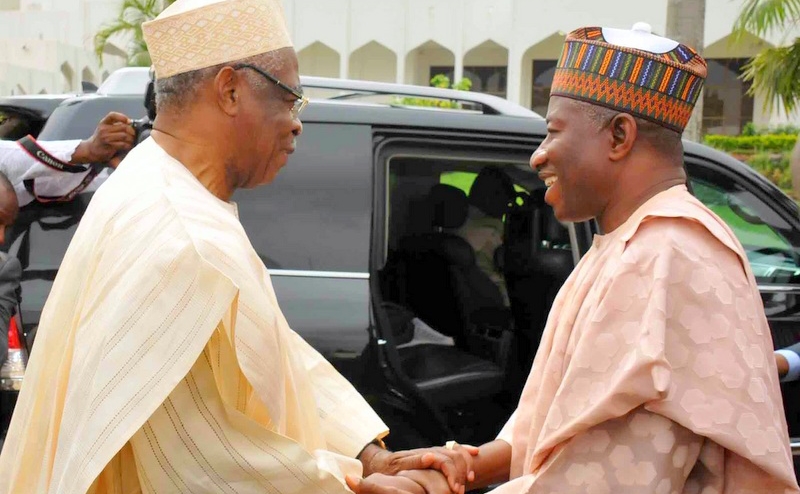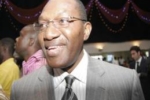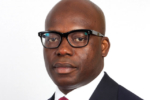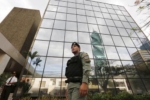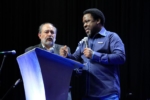Theophilus Danjuma, a retired army general and former defence minister, is one of Nigeria’s richest personalities, courtesy of his ownership of one of Nigeria’s most lucrative oil blocs and a money spinning shipping firm.
The retired general is a long time user of offshore entities, and the Mossac Fonseca files has now exposed another of his companies – Eastcoast Investments Inc – which he incorporated in Nassau, in the Bahamas, on March 25, 1997.
At inception, Mr. Danjuma and a certain Colin Marcel Dixon were directors of the company.
PREMIUM TIMES learnt that the general formed the company to enable him to do business with Scancem International of Norway when the later decided to expand its involvement in Africa to include a project in Nigeria.
But the company soon became embroiled in a messy bribery scandal, with Scancem, according to court papers, later buying out Eastcoast Investment from the project on December 1, 2003.
It was later determined that “the money went mainly to another account, Eastcoast Investment had, to General T.Y. Danjuma and a certain The Volta Company”.
As the controversy raged, Mr. Danjuma resigned as director of the company, but we did not sight any document indicating that he transferred his shareholding to anyone.
A certain Satish Chander Dosaj, who later died, replaced him. On his death, Elizabeth Dixon, believed to be Mr. Dixon’s wife, was brought in as director.
But even before incorporating Eastcoast as a special purpose vehicle to do business with Scancem, Mr. Danjuma had used several offshore entities in the past, mostly registered in tax havens.
The database, Opencorporates, indicate that Mr. Danjuma served as director and vice-president of Cross Group Holdings International, which was registered in Panama on October 15, 1976.
Mr. Danjuma was still in service and was Chief of Army Staff at the time the company was incorporated. He was also director of Zara Logistics, a company registered in Cyprus on September 2, 1993.
It remains unclear what businesses Mr. Danjuma used the companies to transact.
The retired general was also among global personalities found to maintain secret accounts, operated with codes, with the Swiss branch of banking giant, HSBC.
He was linked to HSBC account 15731CD, which was opened in 1993 and closed in 2001.
That revelation came to during the February 2015 #Swissleaks investigation which exposed some of Nigeria’s wealthiest industrialists, former government officials and their relatives, among thousands of individuals around the world who operated highly secretive foreign accounts with HSBC, concealing their identities for years and using codes perhaps to shake off tax authorities from accounts.
Some of the accounts were found to hold illicit assets from criminals, traffickers, arms dealers and other outlaws, secret files published last week by a consortium of journalists around the world have shown.
That trove of documents, released by the French Daily, Le Monde and ICIJ, in partnership with PREMIUM TIMES, and a host of other major media organisations around the world, showed how HSBC profited doing business with people who stole from their countries and some of the world’s most notorious con artists, including people who made a fortune fuelling wars in Africa.
PREMIUM TIMES was also the only Nigerian publication involved in that investigation, which lasted several months between 2014 and 2015.
The documents seen by this newspaper at the time did not provide details regarding the balances in the account and the use to which Mr. Danjuma put it.
An elaborate bribery and corruption Scheme
Court documents obtained by PREMIUM TIMES independently of the leaked Mossac Fonseca files described Scancem, Mr. Danjuma’s business partner, as being “involved in extensive bribery and corruption in a number of countries in Africa”.
The company’s elaborate bribery operation in the continent was supervised and coordinated by the head of its Africa business, Tor Egil Kjelsaas, who also had a warm relationship with the retired general and his company.
It was revealed that sometimes, Mr Kjelsaas withdrew cash from banks in London and Luxembourg and flew with it to bribe local contacts in Africa, especially in Ghana.
Some of the monies were handed over to local contacts in envelopes while others were transferred to accounts in Luxembourg, Switzerland and other places.
But while Mr Kjelsaas was helping to coordinate Scancem bribery operation across Africa, he was alleged to have kept some of the bribe money for himself.
The document also revealed how Messrs. Danjuma, Kjelsaas and Dixon, who himself was an employee of Scancem, allegedly collaborated to obtain a $3.2 million buyout from Scancem.
Scancem operations in Nigeria started in 1997 but was short-lived because the company incurred huge losses which the court blamed on Mr. Kjelsaas, who left the company in 1999 but was retained as a consultant until 2001 and was involved in the company’s operation at the time.
“Kjelsaas drained Scancem’s involvement in Nigeria of significant funds,” the court revealed.
Due to the huge losses, Scancem opted to walk out from the Nigerian operations, but its contract with Eastcoast, which was signed under Mr. Kjelsaas’ management, required it to pay out a significant sum to Eastcoast before it could exit the partnership. If Scancem had taken this option, its losses would have been very significant. So, it decided to buy out Eastcoast’s shares in the business.
In July 2003, before buying out Eastcoast, Scancem hired Hibis, a private investigative company to make enquiries about the ownership of Eastcoast, the company discovered that “most of the commission moneys paid to Eastcoast went toMr. Dixon and a company, Tormead Ltd.
Further investigation showed that Mr Kjelsaas was the real owner of Tormean Ltd. According to court documents, $190,000.00 was transferred to Tormead Ltd from the contractual commission paid to Eastcoast.
On December 1, 2003, Scancem bought out Eastcoast for $3.2 million. Once the money was paid, most of it was transferred to another account operated by Eastcoast, some to Mr. Danjuma, while $790,000.00 was transferred to The Volta Company, a firm believed to be linked with Mr Kjelsaas.
Mr. Danjuma did not answer calls made by PREMIUM TIMES to his known mobile number. Neither did he respond to text messages seeking comments for this story.
This page has been viewed 369 times
Tags : #PanamaPapers

